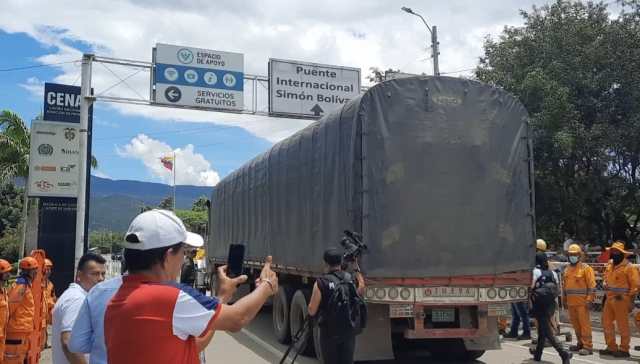
Although this Monday, Nicolás Maduro, announced that as of January 1st the transit of private vehicles will once again reopen on the international bridges that connect Táchira State with Norte de Santander Department (Colombia), a large part of Venezuelan and Colombian businessmen distrust the formal passage of their merchandise through this border.
Luz Dary Depablos // LaPatilla.com
It should be remembered that these binational crossings were unilaterally and arbitrarily blocked on August 19th, 2015 by order of Nicolás Maduro and before those seven years there were intermittent closures.
In recent days at the Francisco de Paula Santander and Simón Bolívar international bridges on the Colombian side, there have been changes with the clearance of the crossings, after Colombian officials removed the metal fences.
Likewise, for this Thursday it is expected that the “Tienditas” international bridge will be inaugurated and enabled on the Venezuelan side, located in the “Pedro María Ureña” Municipality of Táchira State, where the 17 containers that were placed by the regime to hinder the passage of humanitarian aid in February 2019 still remain.
“There are many expectations with the opening of the “Tienditas” bridge, but if Caracas does not minimize (import and export) procedures, the passage of merchandise through this border will continue to be difficult,” said Donamaris Ramírez, former mayor of Cúcuta and an ally of the Chavista governor, Freddie Bernal.
For more than a week, at least 29 companies have received authorization from the regime “for the passage of supplies with few requirements,” according to Donamaris Ramírez.
He stated that these loads, made up mainly of “baby chicks, food and agricultural supplies”, with special permits, would be carried out until December 31st, in order to supply Táchira State, since as of January 1st there will be a full reopening of binational crossings.
For his part, Carlos Entrena, Director of the international Colombian company “Condor”, the company in charge of moving the first loads across the Simón Bolívar bridge on September 26th when binational trade was reactivated across this border, emphasized that it continues to try to win over customers who cross their items through the border of Paraguachón (Zulia State), so that they migrate to Norte de Santander.
However, it has not been easy to recover the confidence of both Venezuelan and Colombian businessmen, so that they carry out their operations through Táchira, despite the fact that transfer times and costs are reduced by more than 40 percent approximately. but businessmen fear that a new arbitrary order to close international bridges will affect the passage of their merchandise.
“Paraguachón never closed, the idea is to recover the trust of businessmen,” said Entrena. He also pointed out that at present they continue to pass “between 70 and 80 trucks monthly through Paraguachón”. loads that for decades used to cross through Táchira.
“The idea is that it (trade) be activated through Norte de Santander, in terms of productivity, competitiveness, costs, it is much better through Táchira,” he said.
On the other hand, the people of Táchirá continue to await the requirements that the Colombian government will demand for the entry and exit of private vehicles and motorcycles into their country, despite the fact that the mayor of Cúcuta, Jairo Yáñez, considers that it would be negative for the Colombian merchants the entry of Venezuelan vehicles, because supposedly they would collapse the city.

